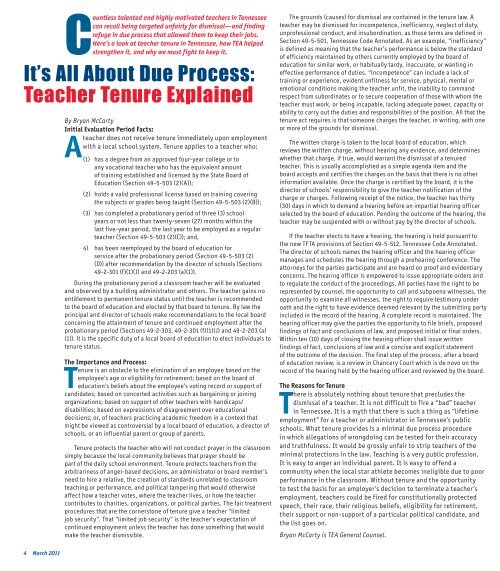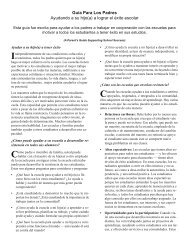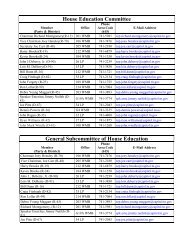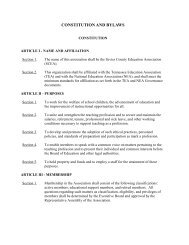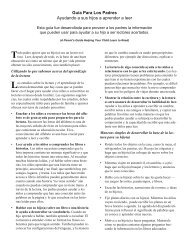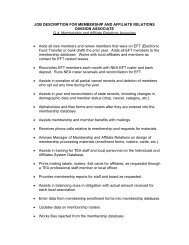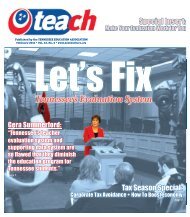Tennessee's Teachers Will Not Be Silenced - Tennessee Education ...
Tennessee's Teachers Will Not Be Silenced - Tennessee Education ...
Tennessee's Teachers Will Not Be Silenced - Tennessee Education ...
Create successful ePaper yourself
Turn your PDF publications into a flip-book with our unique Google optimized e-Paper software.
Countless talented and highly motivated teachers in <strong>Tennessee</strong><br />
can recall being targeted unfairly for dismissal—and finding<br />
refuge in due process that allowed them to keep their jobs.<br />
Here’s a look at teacher tenure in <strong>Tennessee</strong>, how TEA helped<br />
strengthen it, and why we must fight to keep it.<br />
It’s All About Due Process:<br />
Teacher Tenure Explained<br />
By Bryan McCarty<br />
Initial Evaluation Period Facts:<br />
A<br />
teacher does not receive tenure immediately upon employment<br />
with a local school system. Tenure applies to a teacher who:<br />
(1) has a degree from an approved four-year college or to<br />
any vocational teacher who has the equivalent amount<br />
of training established and licensed by the State Board of<br />
<strong>Education</strong> (Section 49-5-503 (2)(A));<br />
(2) holds a valid professional license based on training covering<br />
the subjects or grades being taught (Section 49-5-503 (2)(B));<br />
(3) has completed a probationary period of three (3) school<br />
years or not less than twenty-seven (27) months within the<br />
last five-year period, the last year to be employed as a regular<br />
teacher (Section 49-5-503 (2)(C)); and,<br />
4) has been reemployed by the board of education for<br />
service after the probationary period (Section 49-5-503 (2)<br />
(D)) after recommendation by the director of schools (Sections<br />
49-2-301 (f)(1)(J) and 49-2-203 (a)(1)).<br />
During the probationary period a classroom teacher will be evaluated<br />
and observed by a building administrator and others. The teacher gains no<br />
entitlement to permanent tenure status until the teacher is recommended<br />
to the board of education and elected by that board to tenure. By law the<br />
principal and director of schools make recommendations to the local board<br />
concerning the attainment of tenure and continued employment after the<br />
probationary period (Sections 49-2-303, 49-2-301 (f)(1)(J) and 49-2-203 (a)<br />
(1)). It is the specific duty of a local board of education to elect individuals to<br />
tenure status.<br />
The Importance and Process:<br />
Tenure is an obstacle to the elimination of an employee based on the<br />
employee’s age or eligibility for retirement; based on the board of<br />
education’s beliefs about the employee’s voting record or support of<br />
candidates; based on concerted activities such as bargaining or joining<br />
organizations; based on support of other teachers with handicaps/<br />
disabilities; based on expressions of disagreement over educational<br />
decisions; or, of teachers practicing academic freedom in a context that<br />
might be viewed as controversial by a local board of education, a director of<br />
schools, or an influential parent or group of parents.<br />
Tenure protects the teacher who will not conduct prayer in the classroom<br />
simply because the local community believes that prayer should be<br />
part of the daily school environment. Tenure protects teachers from the<br />
arbitrariness of anger-based decisions, an administrator or board member’s<br />
need to hire a relative, the creation of standards unrelated to classroom<br />
teaching or performance, and political tampering that would otherwise<br />
affect how a teacher votes, where the teacher lives, or how the teacher<br />
contributes to charities, organizations, or political parties. The fair treatment<br />
procedures that are the cornerstone of tenure give a teacher “limited<br />
job security”. That “limited job security” is the teacher’s expectation of<br />
continued employment unless the teacher has done something that would<br />
make the teacher dismissible.<br />
The grounds (causes) for dismissal are contained in the tenure law. A<br />
teacher may be dismissed for incompetence, inefficiency, neglect of duty,<br />
unprofessional conduct, and insubordination, as those terms are defined in<br />
Section 49-5-501, <strong>Tennessee</strong> Code Annotated. As an example, “inefficiency”<br />
is defined as meaning that the teacher’s performance is below the standard<br />
of efficiency maintained by others currently employed by the board of<br />
education for similar work, or habitually tardy, inaccurate, or wanting in<br />
effective performance of duties. “Incompetence” can include a lack of<br />
training or experience, evident unfitness for service, physical, mental or<br />
emotional conditions making the teacher unfit, the inability to command<br />
respect from subordinates or to secure cooperation of those with whom the<br />
teacher must work, or being incapable, lacking adequate power, capacity or<br />
ability to carry out the duties and responsibilities of the position. All that the<br />
tenure act requires is that someone charges the teacher, in writing, with one<br />
or more of the grounds for dismissal.<br />
The written charge is taken to the local board of education, which<br />
reviews the written charge, without hearing any evidence, and determines<br />
whether that charge, if true, would warrant the dismissal of a tenured<br />
teacher. This is usually accomplished as a simple agenda item and the<br />
board accepts and certifies the charges on the basis that there is no other<br />
information available. Once the charge is certified by the board, it is the<br />
director of schools’ responsibility to give the teacher notification of the<br />
charge or charges. Following receipt of the notice, the teacher has thirty<br />
(30) days in which to demand a hearing before an impartial hearing officer<br />
selected by the board of education. Pending the outcome of the hearing, the<br />
teacher may be suspended with or without pay by the director of schools.<br />
If the teacher elects to have a hearing, the hearing is held pursuant to<br />
the new TFTA provisions of Section 49-5-512, <strong>Tennessee</strong> Code Annotated.<br />
The director of schools names the hearing officer and the hearing officer<br />
manages and schedules the hearing through a prehearing conference. The<br />
attorneys for the parties participate and are heard on proof and evidentiary<br />
concerns. The hearing officer is empowered to issue appropriate orders and<br />
to regulate the conduct of the proceedings. All parties have the right to be<br />
represented by counsel, the opportunity to call and subpoena witnesses, the<br />
opportunity to examine all witnesses, the right to require testimony under<br />
oath and the right to have evidence deemed relevant by the submitting party<br />
included in the record of the hearing. A complete record is maintained. The<br />
hearing officer may give the parties the opportunity to file briefs, proposed<br />
findings of fact and conclusions of law, and proposed initial or final orders.<br />
Within ten (10) days of closing the hearing officer shall issue written<br />
findings of fact, conclusions of law and a concise and explicit statement<br />
of the outcome of the decision. The final step of the process, after a board<br />
of education review, is a review in Chancery Court which is de novo on the<br />
record of the hearing held by the hearing officer and reviewed by the board.<br />
The Reasons for Tenure<br />
There is absolutely nothing about tenure that precludes the<br />
dismissal of a teacher. It is not difficult to fire a “bad” teacher<br />
in <strong>Tennessee</strong>. It is a myth that there is such a thing as “lifetime<br />
employment” for a teacher or administrator in <strong>Tennessee</strong>’s public<br />
schools. What tenure provides is a minimal due process procedure<br />
in which allegations of wrongdoing can be tested for their accuracy<br />
and truthfulness. It would be grossly unfair to strip teachers of the<br />
minimal protections in the law. Teaching is a very public profession.<br />
It is easy to anger an individual parent. It is easy to offend a<br />
community when the local star athlete becomes ineligible due to poor<br />
performance in the classroom. Without tenure and the opportunity<br />
to test the basis for an employer’s decision to terminate a teacher’s<br />
employment, teachers could be fired for constitutionally protected<br />
speech, their race, their religious beliefs, eligibility for retirement,<br />
their support or non-support of a particular political candidate, and<br />
the list goes on.<br />
Bryan McCarty is TEA General Counsel.<br />
An Urgent Message to all <strong>Tennessee</strong> Educators!<br />
SB 102 — sponsored by Sen. Dolores Gresham (R-Somerville). This bill<br />
would remove from TEA the right to elect teacher representatives<br />
on the Board of Trustees of the <strong>Tennessee</strong> Consolidated Retirement<br />
System (TCRS). Your message to legislators might include:<br />
• <strong>Teachers</strong> have every right to be involved in decision-making regarding<br />
their hard-earned retirement benefits.<br />
• This change in law would weaken the teacher voice by making<br />
retirement board members political appointments.<br />
HB 159/SB 136 — sponsored by Rep. Glen Casada (R-College Grove) and<br />
Sen. Bill Kentron (R-Murfreesboro). This bill would prohibit payroll dues<br />
deduction for public employees. Your message to legislators might include:<br />
• This bill has nothing to do with education reform.<br />
• It is obviously an attempt to weaken the rights of employees and their<br />
association.<br />
HB 160/SB 139 — sponsored by Rep. Glen Casada (R-College Grove) and Sen.<br />
Bill Ketron (R-Murfreesboro). This bill would make it illegal for TEA’s<br />
political action committee to make contributions to any candidate.<br />
Your message to legislators might include:<br />
• This bill is an overt attempt to silence the collective voice of our<br />
Association.<br />
The careers of <strong>Tennessee</strong>’s <strong>Teachers</strong><br />
are at stake!<br />
Even more “bad bills” are being introduced to the Legislature.<br />
Several bills have been filed in the 107th <strong>Tennessee</strong> General<br />
Assembly that attack all educators and the <strong>Tennessee</strong> <strong>Education</strong><br />
Association. To assist in the effort to defeat these punitive bills,<br />
it is essential that our legislators receive a Vote “NO” message<br />
from every educator across the state. These bills have nothing<br />
to do with “education reform” in <strong>Tennessee</strong>.<br />
HB 130/SB 113 — sponsored by Rep. Debra Maggart<br />
(R-Hendersonville) and Sen. Jack Johnson (R-College Grove).<br />
Simply put, this bill would completely repeal the<br />
<strong>Tennessee</strong> Professional Negotiations Act. Your message<br />
to legislators might include:<br />
• Student learning conditions are, in fact, teachers working<br />
conditions.<br />
• This bill would “turn back the clock” and is an attempt<br />
to silence the voice of teachers regarding all aspects of<br />
employment, including working conditions, salaries and<br />
benefits.<br />
Your Help is Needed!<br />
TEA leaders want to impress on<br />
members that these bills are very<br />
real threats and could pass in the<br />
near future. Our strength<br />
in fighting these attacks<br />
lies solely in massive<br />
opposition from our<br />
members across<br />
the state. This is the<br />
time to speak out<br />
— if you wait<br />
it may be<br />
too late!<br />
Contact your<br />
legislators now by<br />
going to<br />
TEA’s Legislative<br />
Action Center:<br />
http://capwiz.com/<br />
nea/tn/home/<br />
4 March 2011 5<br />
www.teateachers.org


